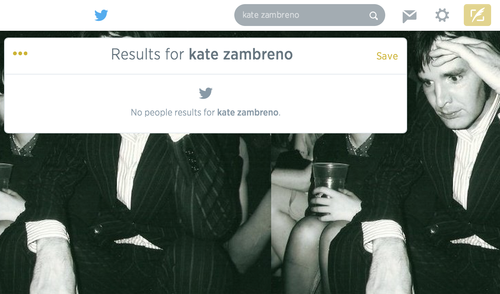
In the second week of this series, ten of my favorite people on Twitter talk about what they do on Twitter and why—their Twitter philosophies, their do’s and don’ts, and what they make of the medium in general. This week features the writer Kate Zambreno, whose Twitter feed was one of the most fascinating while it still existed (in December she killed it). In the wake of her third and most controversial book, Heroines—about “the mad wives of modernism"—Zambreno’s feed seemed to be a place where a heated conversation between writers and feminists was always on the verge of breaking out into some greater meaning. Before Twitter, she ran a popular blog (which she has also shut down) called Frances Farmers Is My Sister. Next week sees the republication of her second novel, Green Girl (Harper Perennial) as well as the ebook release of Heroines.
—Sheila Heti
SHEILA HETI: I know you’re no longer on Twitter but I’m working on a series about what might be good strategies for being on it; what makes a good tweet, what are good attitudes to display and bad ones, boring ones, off-putting ones… You were so interesting on Twitter and I wondered if you wanted to send me a list of some observations of what works in that medium and what doesn’t, or what you did that you personally feel was successful or not.
KATE ZAMBRENO: I kind of played against what was "good” or “successful” and ultimately quit Twitter because I found myself repulsive, caring and craving so much for witness and recognition, and warring against myself whether to promote myself on Twitter or retweet praise or write about the process of writing, which felt at times like a sort of promotion, a real-time behind-the-scenes I’m Writing! Read my Next Book Entitled Suicide is Amazing in 2016!—even though I like writing about process, and I like reading about writer’s processes. I like reading when the writer Katherine Angel (@KayEngels), my British pen pal, tweets about writing, and tweets other writers on writing, but I think that’s because she’s doing it out of an intellectual curiosity and obsession, not to promote herself. Basically, whenever I think I’m doing something that would be good for publicity, I wind up bailing on it. Maybe I have issues with success. I find failure more interesting. I also think in general the writers who use Twitter to promote themselves or their projects, instead of writing about ideas or writing about reading or posting weird jokes or having a conceptual project, were the ones I found really boring, like being at a publishing party, and it made me...
You have reached your article limit
Sign up for a digital subscription and continue reading all new issues, plus our entire archives, for just $1.50/month.
Already a subscriber? Sign in




